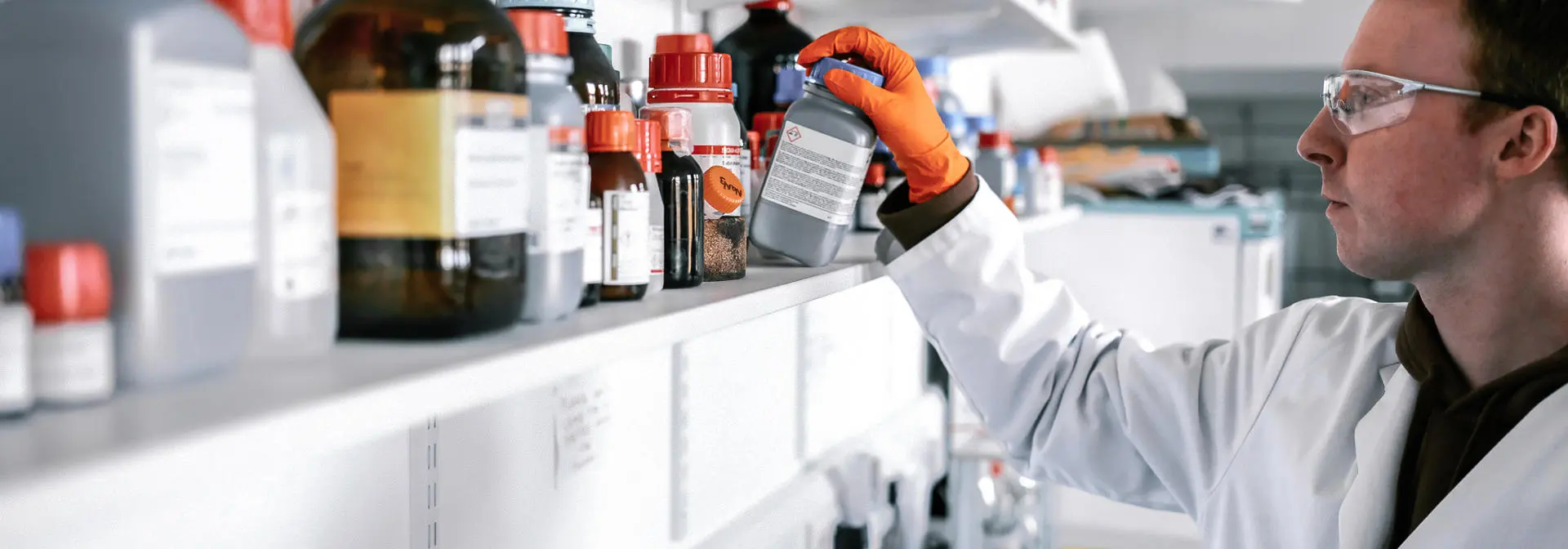Key information
- Level
- Postgraduate Taught
- Delivery type
- Full Time, Part Time
- Degree qualification
- MSc
- Mode of delivery
- On-Campus
- Duration
- 1 year
- Location
- Edinburgh
- Start date
- September
Toxicologists assess the adverse, harmful effects that substances have on human health and the environment. Toxic substances can be natural resources such as arsenic and mercury, generated by living organisms such as microorganisms, algae, and shellfish, or generated by humans. Man-made sources include unintentional substances such as pollutants from traffic as well as industrial chemicals or pharmaceuticals. Toxicologists play an important role in making our lives more sustainable, by considering safety when designing new substances or by identifying safer alternatives.
This MSc programme will provide you with an advanced understanding of the multidisciplinary field of Toxicology. You’ll learn about the fundamental principles of Toxicology, the harmful effects that different substances (e.g., chemicals, pharmaceuticals, food, drink, pollutants,) have on human health and the environment, how the safety and sustainability of substances is assessed and improved through design strategies, what regulations exist to protect human health from the harmful effects of substances, as well as topical and emerging issues in Toxicology.
Over recent years, there has been a desire to transition away from animal testing in Toxicology and the generation of data using new approach methodologies (NAMs) means that the knowledge and skills required by toxicologists is changing. You will learn why alternative (non-animal) approaches are being increasingly used for hazard identification to make Toxicology testing more ethical, quicker, predictive, and potentially cheaper when compared to more traditional animal (mammalian) tests.
You will learn how to critically appraise the quality of existing literature and communicate scientific concepts and research findings to different audiences. You’ll gain skills that enable you to work as a Toxicologist in sectors such as academia, Government, and industry to meet the current growing global demand for trained Toxicologists. The UK currently tackles the regulations and policies related to substance safety, which was previously provided by the EU pre-Brexit, and is desperately seeking trained Toxicologists. The knowledge and practical skills you will gain through this master’s degree, will make you highly sought after upon graduation.
Your student experience
Heriot-Watt University is recognised internationally for studying the toxicology of particles, fibres, pollutants, nanomaterials, and advanced materials. These research outputs have been widely published (over 200 papers), and have been used to inform:
- UK and EU funding priorities,
- the development of regulations,
- updates to global guidance on strategies to reduce reliance on animal testing for regulatory purposes.
Go Global
There are currently no Go Global opportunities for this particular programme. However, other Go Global opportunities may be available. Please contact studywithus@hw.ac.uk for more information.
Course content
September Intake - Edinburgh
Year 1
Mandatory September
- Food and Beverage Toxicology
- Marine Ecotoxicology
Optional September
- Toxicology
- Pathobiology of Human Disease
- Technologies for Biosystems
- The Engineering-Biology Interface
- Introduction to Pharmaceutical Chemistry
Mandatory January
- Research and Professional Practice
- Regulation of the Safe and Sustainable Development of Substances
- Emerging Issues and Innovations in Toxicology
Mandatory May
- MSc Research Project in Bioscience
Optional January
- Principles of Drug Discovery & Development
- Human Diseases and Therapeutic Interventions
Disclaimer
The courses mentioned above may change between now and the time that you study. For more information, please view our Terms and Conditions.
Programme Video
Study MSc Toxicology at Heriot‑Watt University
Talk with a student
Join Theresa as she talks about why she chose to study MSc Toxicology at Heriot-Watt University, explores her learning environment and course content, and her plans for life after graduation.
Fees and funding
| Status | Full Time | Part Time |
|---|---|---|
| UK | £12,744 | £6,372 |
| International | £28,952 | £14,476 |
- Status: Your residency status is usually defined as the country where you have been ordinarily resident for the three years before the start of your course.
- International: 'International' includes applicants from European Union countries who do not hold Pre-Settled or Settled status in UK. (This does not include students from the Republic of Ireland - see above).
Scholarships and bursaries
Postgraduate scholarships and bursaries
We aim to encourage well-qualified, ambitious students to study with us and we offer a wide variety of scholarships and bursaries to achieve this. Over £6 million worth of opportunities are available in fee and stipend scholarships, and more than 400 students benefit from this support.
Entry requirements
We have standard entry requirements for all of our courses that you will have to meet.
Year 1
A minimum of honours degree at 2:2 or non-UK equivalent in a relevant subject such as Biological Sciences, Biomedical Sciences, Biochemistry, Pharmacology, Environmental Science, Zoology, Chemistry or Toxicology.
We welcome applications from international students and accept qualifications from around the world. Please refer to the entry requirements for your country for more details.
English language requirements
If your first language is not English, we'll need to see evidence of your English language ability.
The minimum English language requirement for entry to this programme is IELTS 6.0 (or equivalent) with no score lower than 5.5.
If you do not have IELTS 6.0, we offer a range of English language courses to help you meet the English language requirement for this programme prior to commencing your studies.
Please see our detailed English language requirements.
Why Heriot-Watt
We're the top university in Scotland for graduate outcomes which means that more of our graduates are employed or in postgraduate education than any other institution in the country and we ranked 5th in the UK.
We're also rated number one in the UK for CEO or MD roles, meaning more of our graduates go on to become CEOs or MDs than any other university in the whole of the UK. On top of that, we have beautiful campuses, across the globe, so you'll get a truly international education. Our Edinburgh Campus is home to Oriam, Scotland's National Sports Performance Centre combined with plenty of wellbeing resources, prioritising fitness and mental health for all students. Our Global Research Institutes look at solving real world issues such as climate change and saving our oceans as well as working on the next medical technological breakthrough and the future of AI and robots.
Student life
Explore facilities, and chat to staff and students






